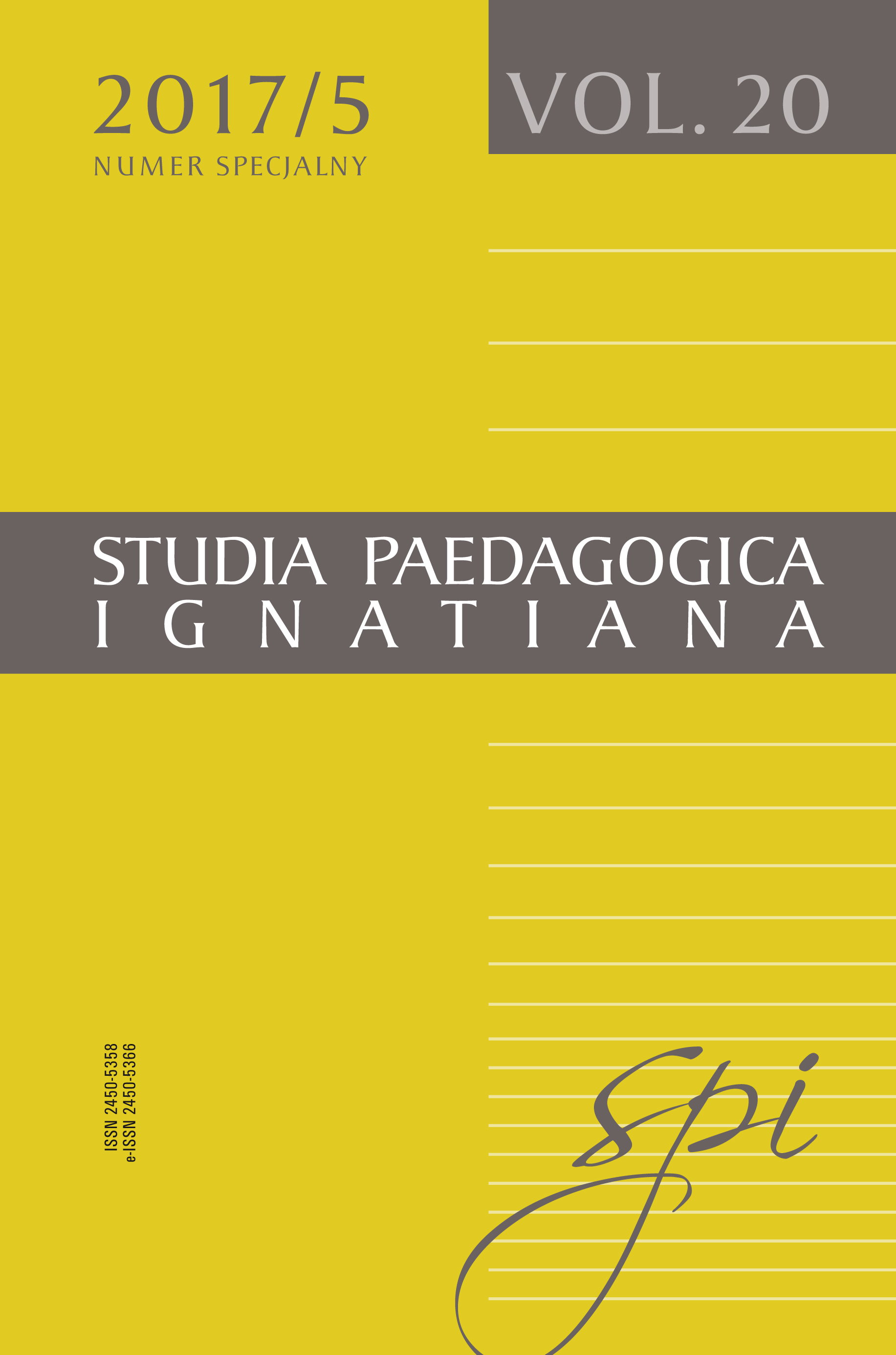O autorytecie Kościoła wychowującego na podstawie opinii i oczekiwań studentów oraz młodszych pracowników katolickiej uczelni
DOI:
https://doi.org/10.12775/SPI.2017.5.005Słowa kluczowe
autorytet Kościoła, autorytet wychowawcy, spadek autorytetu, nadużycia autorytetu, wartości interpersonalneAbstrakt
Misja nauczycielska i wychowawcza Kościoła wymaga autorytetu. Autorytet Kościoła wpływa na skuteczność jego odziaływań wychowawczych. Opracowanie przedstawia wyniki ankietowych badań sondażowych i wywiadów fokusowych przeprowadzonych wśród studentów oraz pracowników naukowych uczelni katolickiej, dotyczących opinii na temat podstaw autorytetu Kościoła w Polsce, rodzaju posiadanego autorytetu, zmian (spadku) w zakresie autorytetu Kościoła i jego przyczyn, a także opinii na temat: Jak Kościół może budować swój autorytet, aby móc skuteczniej wychowywać? Badania pokazały, że według opinii ankietowanych nastąpił spadek autorytetu Kościoła, a przyczyny tego są złożone. Młodzi wierzący chcieliby pogłębienia więzi z Kościołem, oczekują jednak większej otwartości Kościoła i poszanowania ich wolności.Bibliografia
Banach W., Zagadnienie autorytetu. O. Józefa Marii Bocheńskiego analiza problemu, „Filo-Sofija” 2013, 2(21), s. 151‒157.
Baniak J., Kościół instytucjonalny w krytycznym spojrzeniu dzisiejszych katolików polskich (I),„Przegląd Religioznawczy” 2011, nr 2 (240), s. 91‒114.
Baniak J., Portret księdza w wyobrażeniach i ocenach polskiej młodzieży. Studium socjologiczne, Nomos, Kraków 2013.
Baniak J., Prestiż Kościoła instytucjonalnego w Polsce a zmiana społeczna.Studium socjologiczne, „Poznańskie Studia Teologiczne” t. 13, 2002,
s. 153‒195.
Baniak J., Religia katolicka i Kościół rzymskokatolicki w opiniach polskiej młodzieży. Od akceptacji do kontestacji, Nomos, Kraków 2015.
Baniak J., Wprowadzenie, w: Katolicyzm polski na przełomie wieków, teologiczny, instytucjonalny i wspólnotowy wymiar Kościoła, red. J. Baniak, UAM, Poznań 2002, s. 7‒11.
Baniak J., Zagubiony Kościół (część II, dokończenie), „Res Humana” 2016, nr 1, S. 28‒31.
Bocheński J., Logika i filozofia. Wybór pism, opracował J. Parys, Wydawnictwo Naukowe PWN, Warszawa 1993.
Bocheński J., Sto zabobonów. Krótki filozoficzny słownik zabobonów, Wydawnictwo Philed, Kraków 1994.
Borowik I., Stosunek młodzieży do Kościoła rzymskokatolickiego w Polsce w perspektywie wywiadów biograficznych, „Socjologia Religii” 2005,
t. 3, s. 149‒167.
Jarmoszko S., Autorytet czy może władza – u podstaw nieporozumień, uproszczeń i mistyfikacji, w: Autorytet w wychowaniu i edukacji, red. D. Łażewska, Wydawnictwo WSGE, Józefów 2013, s. 22‒57.
Mariański J., Emigracja młodzieży polskiej z Kościoła?, „Keryks” 2009, nr 8,
s. 193‒223.
Mariański J., Kościół instytucjonalny w Polsce – szanse i zagrożenia, w: Katolicyzm polski na przełomie wieków, teologiczny, instytucjonalny i wspólnotowy wymiar Kościoła, red. J. Baniak, UAM, Poznań 2002, s. 41‒71.
Mariański J., Kościół katolicki w społeczeństwie obywatelskim, Redakcja Wydawnictw KUL, Lublin 1998.
Mariański J., Postawy Polaków wobec Kościoła Katolickiego – analiza socjologiczna, „ZN KUL” 2014, 57, nr 1 (225), s. 81‒106.
Mariański J., Religia i Kościół między tradycją i ponowoczesnością ‒ studium socjologiczne, Nomos, Kraków 1997.
Mariański J., Religia w społeczeństwie ponowoczesnym, Oficyna Naukowa, Warszawa 2010. Mazur P., Wychowanie w czasach kryzysu autorytetu, „Zeszyty Społeczne KIK” 2011, s. 183‒192.
Offmański A., Młodzież a Kościół – relacje młodzieży względem Kościoła, w: Katecheza w Kościele i dla Kościoła, red. R. Czekalski, Płocki Instytut Wydawniczy, Płock 2006, s. 37‒51.
Potocki A., Dlaczego młodzież boi się Kościoła?, „Socjologia Religii” 2005, t. 3, s. 167‒182.
Potocki A., Młodzież o Kościele – krytycznie i z dystansem, w: Katecheza w Kościele i dla Kościoła, red. R. Czekalski, Płocki Instytut Wydawniczy, Płock 2006, s. 283‒303.
Szczepański J., Autorytet w nauce, w: Autorytet w nauce, red. P. Rybicki, J. Goćkowski, Ossolineum, Wrocław 1980, 13‒18.
Wysocka E., Wymiary religijności młodzieży w społeczeństwie ponowoczesnym, w: Katolicyzm polski na przełomie wieków, teologiczny, instytucjonalny i wspólnotowy wymiar Kościoła, red. J. Baniak, UAM, Poznań 2002, s. 167‒184.
Wysocka E., Młodzież a autorytety: analiza teoretyczna i empiryczne egzemplifikacje. Funkcjonowanie autorytetów w życiu codziennym młodzieży szkół średnich a religijność, w: Mit autorytetu – autorytet mitu, red. J. Sieradzan, Wydawnictwo Uniwersytetu w Białymstoku, Białystok 2009, s. 285‒322.
Pobrania
Opublikowane
Jak cytować
Numer
Dział
Licencja
Autor zgłaszając swój artykuł oświadcza, że:
jest Autorem artykułu (zwanego dalej Utworem) i:
- przysługują mu wyłączne i nieograniczone prawa autorskie do Utworu,
- jest uprawniony/a do rozporządzania prawami autorskimi do Utworu.
Udziela Uniwersytetowi Ignatianum w Krakowie nieodpłatnej, niewyłącznej, nieograniczonej terytorialnie licencji do korzystania z Utworu na następujących polach eksploatacji:
- utrwalania utworu w formie papierowej, a także na nośniku cyfrowym lub magnetycznym;
- zwielokrotnienia utworu dowolną techniką, bez ograniczenia ilości wydań i liczby egzemplarzy;
- rozpowszechniania utworu i jego zwielokrotnionych egzemplarzy na jakimkolwiek nośniku, w tym wprowadzenia do obrotu, sprzedaży, użyczenia, najmu;
- wprowadzenia utworu do pamięci komputera;
- rozpowszechniania utworu w sieciach informatycznych, w tym w sieci Internet;
- publicznego wykonania, wystawienia, wyświetlenia, odtworzenia oraz nadawania i reemitowania, a także publicznego udostępniania utworu w taki sposób, aby każdy mógł mieć do niego dostęp w miejscu i czasie przez siebie wybranym;
- w zakresie praw zależnych do Utworu, obejmujących w szczególności prawo do dokonania koniecznych zmian w Utworze, wynikających z opracowania redakcyjnego i metodycznego, a także do dokonania tłumaczenia Utworu na języki obce.
Udzielenie licencji następuje z chwilą przekazania Utworu na rzecz Uniwersytetowi Ignatianum w Krakowie. Uniwersytet Ignatianum w Krakowie jest uprawniony do udzielania dalszych sublicencji do Utworu, w zakresie udzielonego prawa. Licencja jest ograniczona czasowo i zostaje udzielona na okres 15 lat, licząc od daty jej udzielenia.
Polityka prywatności
Statystyki
Liczba wyświetleń i pobrań: 654
Liczba cytowań: 0



